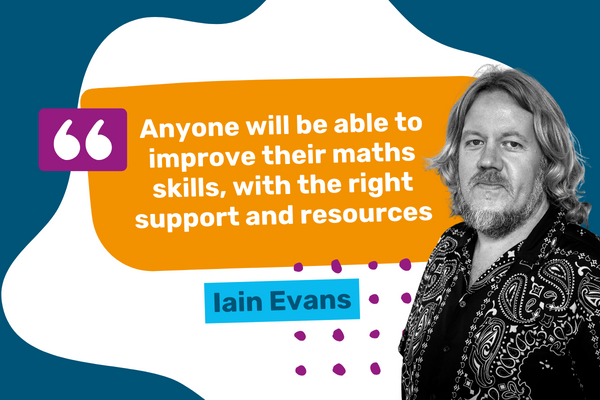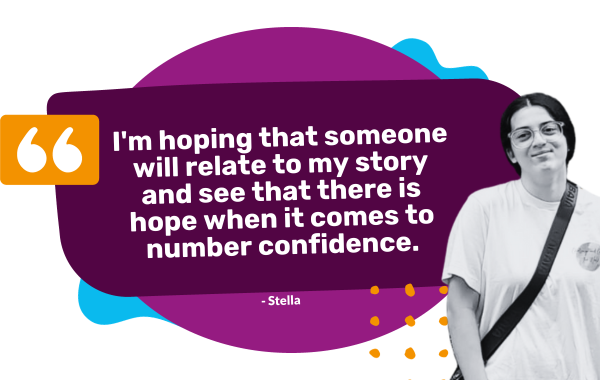"Neurodiversity" is an overall term coined by Judy Singer, a sociologist who is on the autism spectrum herself. She describes it as "the fact that every human has a unique nervous system with a unique combination of abilities and needs."
"Neurodivergent" is a term which is used as an opposite to “neurotypical". Neurotypical describes anyone "whose brain functions, ways of processing information and behaviours are seen to be standard."
Neurodiversity in the workplace relates to inclusivity that ensures neurological differences do not impact recruitment, including hiring and retaining talent with neuro-variations such as autism, ADHD and dyslexia.
It is estimated that around 1 in 7 people (more than 15% of people in the UK) are neurodivergent, meaning that their brain functions, learns and processes information differently, and are likely to be diagnosed with neurological conditions such as:
Anyone with neurodivergent conditions will be able to improve their maths skills and may have abilities expected of their age. They will likely need support to build their confidence and access activities and resources, as there are a range of barriers to maths learning related to these conditions.
Autism
Many people on the autistic spectrum have difficulties with problem solving. This can be due to the problem not being related to areas of personal interest or experience. In such cases we can support by changing the context to something of interest, so the maths activity has greater value to the learner. For example, if we are presenting a data activity, we can relate it to a sport or special interest.
Some people with autism will struggle with misunderstanding of context, due to social difficulties. In these cases, we can support them by talking through any misconceptions and helping them to frame the maths being practised more closely to their own experience and knowledge.
There are often issues with misunderstanding of instructions and specialist maths language, especially where there are homonyms within maths terminology (e.g. “table”, “takeaway” and “mean”). In these instances, checks should be made for understanding and conversations can be had around any misconceptions, possibly building a personal bank of maths words they can refer to, that are relevant to their learning and work.
ADHD
People with ADHD may struggle if maths learning is not linked to their interests, making it extra-hard to focus and recognise the value of the work they are required to put in. This can lead to difficulties engaging in activities and seeing them through to completion.
People with ADHD will benefit from discussions around the personal or professional value of the learning taking place and will also appreciate activities being broken up into manageable and varied chunks to keep focus and interest high. If necessary, it can really help to change the context of a problem into something closer to their individual interests or experiences.
Some people may struggle with word-based problems, reading numbers, and instructions due to a tendency to skim-read, potentially missing key words, or predicting wrongly, which affects the output and can cause significant frustration and demotivation. It is good to support people in these situations by discussing the requirements and ensuring they have enough time to read and digest what is expected of them.
Those with ADHD may also have problems with losing focus and place when reading numbers, instructions and word-based problems, requiring support to ‘chunk’ the learning and make it more manageable.
Dyslexia
The British Dyslexia Association has found that 60% of learners with dyslexia have maths learning difficulties. They may struggle with poor working memory, processing speed and rapid retrieval from long-term memory, all of which can really slow down progress with maths learning and cause significant frustration and anxiety.
Learners struggling in these areas benefit from using tactile items and resources to work with, and being given time and support to develop their maths skills in manageable chunks, without the fear of being ‘put on the spot’ or being subject to time pressures to answer or complete tasks.
Dyslexic learners may also struggle to understand maths terms and language, and could mix-up terms and operational symbols, which can be frustrating and damage self-esteem. Again, time and support is needed, along with opportunities to discuss any misconceptions and details which will make the activity more accessible.
Dyscalculia
Dyscalculia is an unexpected and persistent learning difficulty that makes it hard to understand, learn, or use maths. Although it has been described as "dyslexia with numbers", it is much less well-known and less researched than dyslexia. It is estimated that dyscalculia affects around 4 million people in the UK – 6% of the population.
People with dyscalculia may struggle to recognise amounts up to 5 visually, such as counters, or representations on dice or dominos. This is called "subitizing" and is generally mastered very early on in a neurotypical learner’s maths journey. Without subitizing, any counting, grouping, checking or multiplying activity can take much longer and cause significant anxiety. This difficulty becomes apparent when we note that someone still counts on their fingers when multiplying or needs to use written marks or symbols to count, add, subtract, multiply or divide.
In such cases, visual and tactile resources, such as counters, Numicon, Cuisenaire rods and MathLink Cubes can really help people work with higher numbers and ‘see’ the patterns that many of us take for granted when using our mental maths skills.
Learn more about dyscalculia
Learning difficulties and learning disabilities
Conditions such as dyspraxia, dyslexia, dyscalculia and ADHD are also sometimes referred to as learning difficulties. These differ from learning disabilities as a learning difficulty "does not affect general intellect."
Learning disabilities are described as "a reduced intellectual ability and difficulty with everyday activities". Mencap research suggests there are 1.5 million people with a learning disability in the UK.
Learning disabilities include:
- Moderate Learning Disability
- Severe Learning Disability
- Profound and Multiple Learning Disability (PMLD)
People with learning disabilities will be working at lower academic levels than expected for their age and will benefit from hands-on, tactile learning experiences and close support to take part in activities using real-life items and experiences, to help them develop the maths foundation skills relevant to them in their everyday lives.
In conclusion...
The Autism Education Trust makes an important point when they state that when supporting people with SEND, we should not focus all our efforts on "getting a formal diagnosis" as we can provide effective support to address their needs without this. We need to "know our learners" by building relationships, getting to know their barriers to maths learning, and planning how we can meet their support needs.
Sources and further reading
ADHD UK
The Autism Education Trust: 'What is Autism?'
The Brain Charity: 'Neurodivergent, neurodiversity and neurotypical: a guide to the terms'
British Dyslexia Association: 'How does dyslexia affect maths learning?'
Mencap: 'Learning disability or learning difficulty?'
Mencap: 'Learning Disability Research and Statistics'
Mencap: 'What is a learning disability?'
National Autistic Society
National Numeracy: 'What is dyscalculia?'
National Numeracy: 'What is maths anxiety?'
Neurodiversity Hub: 'What is Neurodiversity?'
Studocu: '40 Study Tips for Neurodiverse Students'
The University of Edinburgh: 'Support for neurodiversity'







